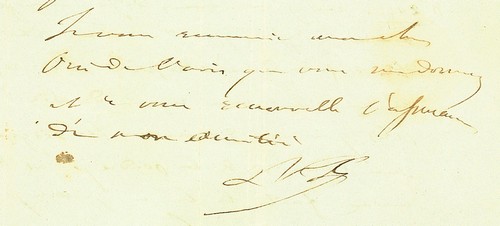
Auction: 13050 - Postal History and Historical documents
Lot: 2087
Historical Documents
Napoleon III
1845 (4 Aug.) A.L.S. of Napoleon III from Ham to Giuseppe Orsi in London. The stationery has the blind-embossed crown stamp of a British stationer in Bath at the upper left. Napoleon was serving life imprisonment in the fortress town of Ham and was writing to his friend on the subject of artillery and gunpowder, in part, "... The drawings which you promise me will, no doubt, be very useful to me at this time, but do not forget to inform me of the exact number of the manuscript, so thus I believe that the drawing you sent me is from the Chronicle of St. Denis, Sloan No. 2433, because I was already familiar with it, but the drawing that I had of it was very inaccurately copied. Today I received a reply from Sir Robert Ellis who gives me an account of the origin of gun powder which is very curious... see if you cannot find some designes of English artillery of the time of Henry VIII. There should certainly be something either earlier or later, but I warn you that I possess the Military Antiquities of Grose which, however, contain little interesting matter. Perhaps there are at the British Museum French manuscripts especially concerning artillery which are not to be found in Paris..."; signed "L.N.B.". The letter with integral address panel includes the red wax seal, Ham, Paris and London c.d.s., boxed "pd" and rated "10"; filing creases and some ink stains on edges of the address panel. A fine and interesting letter. Photo
The letter stems from Louis Napoleon’s desire to rule France. From childhood, he saw himself as an emperor. He was forced to live outside of France after 1816 when the French banished the Bonapartes and confiscated their property following the exile of Napoleon I to the island of St. Helena. Louis Napoleon failed in an attempted coup d’état at Strasbourg on October 30, 1836, and was himself exiled by King Louis Philippe, who treated him mercifully at the time.
This first failed coup did not deter him. Less than four years later, on August 6, 1840, Louis Napoleon failed in a second attempted coup. Leading a small band of 56 loyal supporters, including Lombard, Orsi, and Parquin, he sought to provoke an uprising at Boulogne-sur-Mer, which he hoped would draw General Bernard Pierre Magnan to Lille and allow Louis Napoleon, in turn, to march upon Paris. He was defeated at Boulogne, however, and was captured and tried, along with his conspirators, by the Chamber of Peers.
At his trial, he urged the Peers not to “believe that, yielding to a personal ambition, I wished to attempt in France, and against the nation’s will, to restore the Empire.” Instead, he explained, “the vote of four millions of citizens which elevated my family imposed upon us the duty of making an appeal to the nation, and of consulting the popular will.” Thus, he suggested, he sought only to let the French people make a “free decision” between republic or monarchy, empire or royalty. He did not persuade the Peers, and he was convicted and sentenced to perpetual imprisonment. This time, King Louis Philippe was more severe. On December 15, 1840—the day that the repatriated body of Napoleon I was interred at Les Invalides in Paris—Louis Napoleon was imprisoned in the fortress at Ham.
Orsi had been sentenced to five years.
Louis Napoleon escaped from the Ham fortress in 1846 and lived in England until the French established a republic with the overthrow of King Louis Philippe in 1848. He returned to France for a short time before returning to England at the request of the provisional government. While in England he was elected to the French Constituent Assembly created to draft a new constitution. On December 10, 1848, the first direct election under the constitution of the Second Republic, Louis Napoleon was overwhelmingly elected President of France. When the National Assembly refused to amend the constitution so that he could serve a second term, Louis Napoleon staged another coup d’état and seized dictatorial powers on December 2, 1851—the 47th anniversary of the crowning of Napoleon I as emperor and the 46th anniversary of Napoleon I’s victory at Austerlitz. He reigned as Emperor Napoleon III until 1870, when he was captured during the Franco-Prussian War and was deposed by forces of the Third Republic in Paris two days later.
See lot 2094 for a related item
Subject to 20% VAT on Buyer’s Premium. For more information please view Terms and Conditions for Buyers.
Sold for
£1,000




